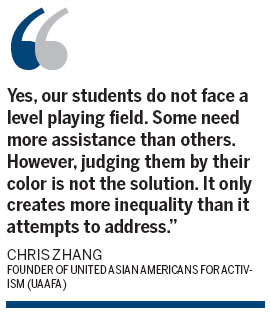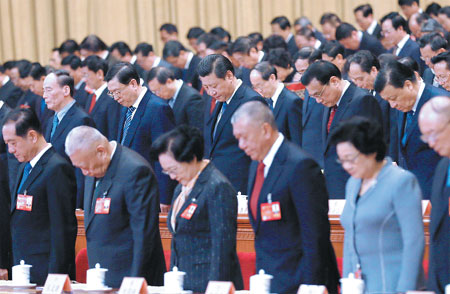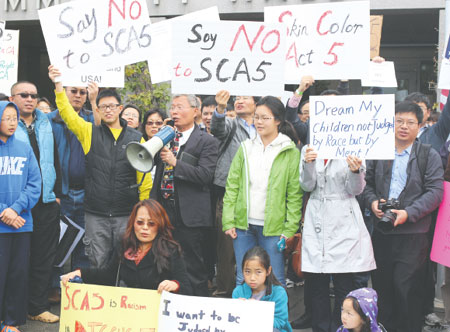SCA-5: A step forward or backward?
Updated: 2014-03-07 14:23
By June Chang (China Daily USA)
|
|||||||||
To its supporters, California Senate Constitutional Amendment No 5 - SCA-5 - would provide a level playing field for admission to the state's higher education institutions, but to many opponents, it simply smacks of racism, June Chang reports from San Francisco.
Sunday afternoons are usually a hectic time for Zhang Ling. The software engineer who lives in the San Francisco Bay Area shuttles her two high school sons, 16 and 18, to tutorials for the SAT college admissions test and extracurricular activities. Last Sunday, March 2, was an exception.
She spent the entire afternoon at a town hall meeting listening to a panel discussion on a subject that many Asian-American families regard as promoting racial discrimination and an unfair game for every student in California: Senate Constitutional Amendment No 5 or SCA-5.
She was joined by about 300 other people in the auditorium of the community center in Cupertino, home of Apple computer, and late comers packed in three hallways, to learn about the possible impact of the recently passed bill that would basically use affirmative action to determine admission to state schools.
"We've never seen a turnout like this in the 14-year history of APAPA," said Albert Wang, moderator of the panel discussion and the Bay Area chairman of the Asian Pacific Islander American Public Affairs Association (APAPA), one of the main organizers of the discussion.
The proposed amendment was passed by the state Senate on Jan 30 with a two-thirds vote. Among the 27 Democrats voting yes were three Chinese Americans (Senators Ted Lieu, Leland Yee and Carol Liu); 11 Republicans voted no. Now it awaits action by the Democrat-controlled state Assembly. If approved, SCA-5 will be presented to California voters as a referendum at the statewide election on Nov 4.
Written by Senator Ed Hernandez, the bill proposes "amending Section 31 of Article 1 thereof, relating to public education"- specifically eliminating public higher education from the requirements of Proposition 209.
Dubbed the California Civil Rights Initiative, Prop 209 was approved by voters in November 1996. It amended the state constitution to prohibit state-supported institutions from discriminating against, or granting preferential treatment to, any individual or group on the basis of race, sex, color, ethnicity, or national origin in the operation of public employment, public education or public contracting.
SCA-5 would remove all anti-discrimination protections in Prop 209.
It would allow such public education institutions as the University of California (UC) and the California State University (CSU) systems - and even K-12 schools - to use race, sex, color, ethnicity or national origin as a consideration for enrolling students or hiring employees.
Third attempt
This is the third time Hernandez has sought to push the bill through the state legislature. His two previous attempts were approved by the Senate and the Assembly but were vetoed by then-Governor Arnold Schwarzenegger in 2010 and by current Governor Jerry Brown in 2011. To take away any chance of another Brown veto, Hernandez offered it as an amendment to the state constitution.
Hernandez was invited to the town hall meeting, but he did not show up.
Instead he sent a statement saying that he is "continuing to meet and hear the concerns from many groups on this issue and hopes to continue a productive discussion that is based on facts despite much of the misleading information that has circulated."
To its supporters, SCA-5 would level the playing field for everyone and compensate minorities for what they consider past wrongs. They believe that reversing Prop 209 and using race as a factor for admission to schools helps underrepresented racial groups, makes college campuses more diverse and brings more fairness to society.
With his assertion that "there has been a precipitous drop in the percentage of Latino, African American and Native American students at California public universities," and "... campuses becoming less diverse and qualified high school graduates being overlooked and ignored under Prop 209," Hernandez maintains that public universities and colleges should have all the tools needed to ensure their campuses reflect California's demographics.
Hernandez points to himself as someone who has benefited from the recruitment and scholarship assistance of affirmative action that targeted minority students, saying it enabled him to attend an optometry school in Indiana.
Lin-chi Wang, past chair of the ethnic studies department at UC Berkeley and one of the four panelists at the town hall meeting, said measures should be taken to change the current university admission policy because he said it emphasizes SAT scores and grade -point averages too much.
"Merit should also include leadership, volunteering, special talent," said the long-time advocate for Asian-American immigrant families, adding that he thought there is a lack of diversity on the UC campus.
"As beneficiaries of affirmative actions we Asian Americans should remember to give chances to everyone, including those from the socio-economically disadvantaged families. In other words, when drinking water, don't forget its source," said Wang.
The opponents
One of the arguments put forth by opponents of SCA-5 is that the purpose of education is to help build a fair society, and the current system of holistic, colorblind admissions with accommodation for the socio-economic disadvantaged on UC and CSU campuses is a fair system.
They also say that SCA-5 will promote racial and ethnic preferences on higher education admissions that will set society back to when people were judged by their skin color instead of merit.
Senator Bob Huff, who voted against SCA-5 and was on the panel at the town hall meeting, said SCA-5 is flawed and will largely affect the Asian population on UC and CSU campuses. "I don't think it's fair," he said.
David Lehrer, president of Community Advocates Inc and also on the panel, echoed Huff's comments, calling the bill "poorly thought out."
"In the clearest and most unambiguous language possible, Prop 209 is neither difficult to understand nor to implement," Lehrer said in a commentary article he co-wrote that was published in the Jewish Journal on Feb 8.
He called it "a step backward in higher education'", and wrote that "at least in terms of public education, the state's universities, colleges and community colleges have to be colorblind."

Leherer said at the panel discussion that there is practically nothing in Hernandez's statement about his proposed amendment that is accurate, but two-thirds of the state Senate "bought his line."
"It is indisputable that both in absolute numbers and percentages, minorities that attend UC have increased and exceed the levels of minority admissions from the pre-Prop 209 days," Lehrer said.
At the University of California in 1996 - the last year before Prop 209's implementation - African Americans accounted for 4 percent of overall admissions (1,628); in 2013 they were 4.3 percent of admissions (2,705), while they made up approximately 6.6 percent of the California population.
Latinos were 14.3 percent of admissions (5,744) in 1996 at the university and 27.8 percent (17,450) of admissions in 2013, and were 38.2 percent of California's population.
Asians made up 32 percent (12,995) of admissions in 1996 and 35.9 percent (22,536) in 2013; they make up about 13.9 percent of the state's population.
Admissions for whites have plummeted to 27.9 percent (17,516) in 2013 from 41 percent (16,465) in 1996; whites make up about 39.4 percent of California's population.
In 1996 in the California State University system, the increase in minority enrollment and the decline in the white ratio generally paralleled those at UC - Latinos up 33.9 percent from 21.4 percent; Asians up to 18 percent from 17.1 percent; whites declined to 30.4 percent from 47.6 percent.
The enrollment of blacks has declined to 5 percent from 7.6 percent, although the actual numbers increased to 18,175 in 2012 from 17,539 in 1995, unlike at the UC system.
According to the latest admission data from UC and CSU, the approximately 72 percent of the Latino high school graduates in California who are UC and CSU-eligible are admitted to either the UC or CSU system schools. In contrast, approximately 52 percent of the state's eligible white students are admitted to UC or CSU schools. Hernandez's claim that "qualified high school graduates (are) being overlooked and ignored under Prop 209" is "rootless", said Lehrer.
The fast-growing Latino population will become the biggest plurality in mid-2014, and reach 48 percent of the state's population by 2060, while whites are expected to decrease to 30 percent of the population, according to the California Department of Finance.
Lehrer said that the UC system virtually leads the entire country in its admission of talented, socio-economically disadvantaged students - independent of race or ethnicity - poor kids who need financial assistance. In 2011-2012, 41 percent (74,933) of the enrolled students at UC and CSU were Pell Grant recipients (i.e. most often undergraduates with family incomes under $20,000).
"If this is not diversity, I don't know what it is," Huff said during the panel discussion.
"At a time when minorities are qualifying for and being admitted on their merits to the state's public universities and colleges -- independent of race or ethnicity -- in record numbers, and disadvantaged applicants are being admitted in extraordinary numbers, SCA-5 will re-inject divisive considerations of race and ethnicity into the mix. There simply are no data that substantiate 'grievances' needing such an extraordinary remedy," said Lehrer.
'Preferential treatment'
"SCA-5 would give preferential treatment based on race, and instill into young minds that we are unequal. Our children would have to learn that people have unequal opportunities for no reason other than the color of their skin," said Chris Zhang, a local attorney and founder of United Asian Americans for Activism (UAAFA) at the meeting.
"Does SCA-5 imply that certain groups are inferior by nature that they require special treatment in order to succeed?" asked Sugar Wang, an activist with UAAFA, in an interview at the meeting.
"Does the Legislature really want to return to allocating admissions on the basis of race and ethnicity? Whose numbers would be reduced and whose increased, and why?" Lehrer asked.
"Yes, our students do not face a level playing field. Some need more assistance than others. However, judging them by their color is not the solution. It only creates more inequality than it attempts to address," said Zhang.
"For example, an Asian-American student has less than one-third of the chance of getting into the same college as a non-Asian student with the same qualifications, even if that Asian student came from an extremely difficult background. SCA-5 is intended to overlook such individual circumstances, and to exacerbate the racial inequality," he said.
Henry Der, former deputy superintendent of public instruction at the California department of education who also was on the panel, said the bill is good-intentioned and there is no mention of quota to be placed in the college-enrollment process.
"Regardless if they have put quotas there, let's go back to the simple fact that there are only a certain number of slots available at our universities," Huff said.
"As soon as Hernandez and his followers want to introduce race as the criteria they can make decisions by, the number of Asian students on UC and CSU campuses will drop tremendously given the relatively marginal Asian population in California," he said.
"This might not be the intent of SCA-5, but this will be the consequences," Huff added.
Contact the writer at junechang@chinadailyusa.com
|
Parents and their children staged a peaceful protest against SCA-5 outside a town meeting on March 2 in Cupertino, California. Photos by Chang Jun/China Daily |
|
Panelists at the town hall meeting in Cupertino discuss the possible impact of SCA-5. From left: Senator Bob Huff, David Lehrer, president of Community Advocates Inc, Lin-chi Wang, past chair of the ethnic studies department at UC Berkeley, and Henry Der, former deputy superintendent of public instruction at the California department of education. |
(China Daily USA 03/07/2014 page20)

 Fancy dresses of world female leaders
Fancy dresses of world female leaders
 China-US relations as revealed in stamps
China-US relations as revealed in stamps
 Electronic passports now available in NY
Electronic passports now available in NY
 Top 10 most expensive cities in the world
Top 10 most expensive cities in the world
 Ten lucky students off to China
Ten lucky students off to China
 Doggie Gras Parade Celebration in US
Doggie Gras Parade Celebration in US
 US first lady preps for China visit
US first lady preps for China visit
 US: Train depot attack 'terrorism'
US: Train depot attack 'terrorism'
Most Viewed
Editor's Picks

|

|

|

|

|

|
Today's Top News
Crimea referendum would violate law: Obama
US House passes Ukraine aid bill
DPRK missile 'near misses' airliner
Premier Li puts accent on reform
US motor-maker revs up in China
China declares 'war' on pollution
China-US relations as revealed in stamps
E-passport available in NY
US Weekly

|

|









